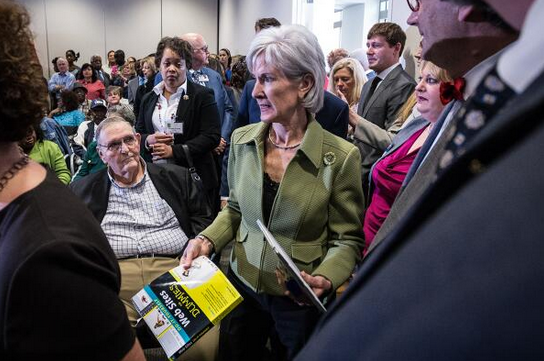Texas Attorney General and 2014 Gubernatorial candidate Greg Abbott unveiled a number of “We the People” policy initiatives last night at the Northeast Tarrant Tea Party geared toward strengthening the rights of individuals against the power of the state. I was on a teleconference with Abbott Sunday in which he previewed the policies to bloggers with the caveat we’d wait until after the speech to talk about them.
The in-depth document is here.
Taken individually, some may seem like welcome, small-ball approaches to protecting individuals from various avenues of government overreach. Taken together, they constitute an interesting, possibly far-reaching template for guaranteeing individual rights, and give Abbott a serious claim to being not only a small government conservative, but one favoring individual rights over the convenience of big business as well.
The brief overview of Abbott’s proposals:
- Recognize a property right in one’s own DNA.
- Make state agencies, before selling database information, acquire the consent of any individual whose data is to be released.
- Prohibit data resale and anonymous purchasing by third parties.
- Prohibit the use of cross-referencing techniques to identify individuals whose data is used as a larger set of information in an online database.
- Require disclosure by all legislators, statewide elected officials, and gubernatorial appointees of any contract, subcontract, or paid relationship with a public entity, including the state and political subdivisions, held by those individuals or their spouses. Violation of this requirement would be a Class A Misdemeanor.
- Prohibit legislators from voting on legislation from which they may financially benefit by closing loopholes in the Texas Government Code, and providing options for both criminal and civil suit to ensure the enforcement of these provisions.
- Prohibit the use of tax dollars for the purpose of engaging a registered lobbyist to lobby on the behalf of a school district or the board or association thereof.
- Prohibit legislators and statewide elected officials who are licensed by the State Bar of Texas from earning referral fees or receiving any benefit from legal referral. Violation of this requirement would be a Class A Misdemeanor.
- Amend the Texas Election Code to require quarterly reporting of campaign financial data by legislators, statewide elected officials, and political action committees.
- Within the last 30 days before an election, impose a requirement that no funds received from a single person or entity above $5,000 may be expended by a campaign or political action committee until those funds have been reported to the Texas Ethics Commission and posted on the campaign or political action committee website.
- Allow voters in counties and municipalities the option to repeal red light camera ordinances and operations by voter-initiated referendum.
- Allow CHL holders to openly carry handguns.
- Allow CHL holders to carry weapons on campus at institutions of higher education, subject to appropriate limits, at the option of the boards of regents of public institutions of higher education, and the internal decision-making of private institutions of higher education.
- Texas should prohibit the state government from enacting a “healthcare exchange” under the Patient Protection and Affordable Care Act (PPACA).
- Pass a state law providing that state resources shall not be expended and state personnel shall not be employed in enforcing or implementing the Patient Protection and Affordable Care Act.
No Republican is going to object to the anti-ObamaCare plank.
I predict that the red light camera plank will be profoundly popular across party lines.
The Open Carry plank is a bold Second Amendment statement on Abbott’s part, considering he’s not facing any serious primary opposition. It might also lure Wendy Davis into pumping up the volume on her opposition to gun control, which will no doubt endear her to no Texas outside he far left-wing base.
Abbott’s plank on property rights to your own DNA is the plank with the last immediate effect and possibly the most profound long-term consequences.
This is just a few preliminary impressions. I want to give the document another going-over and contemplate the implications.
